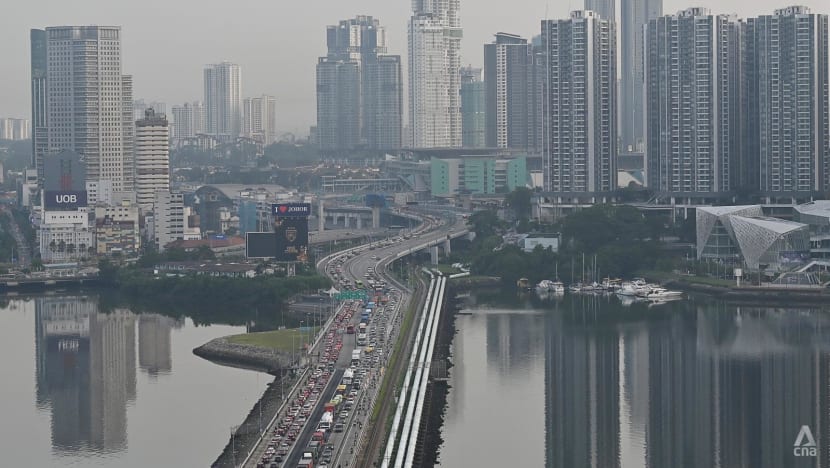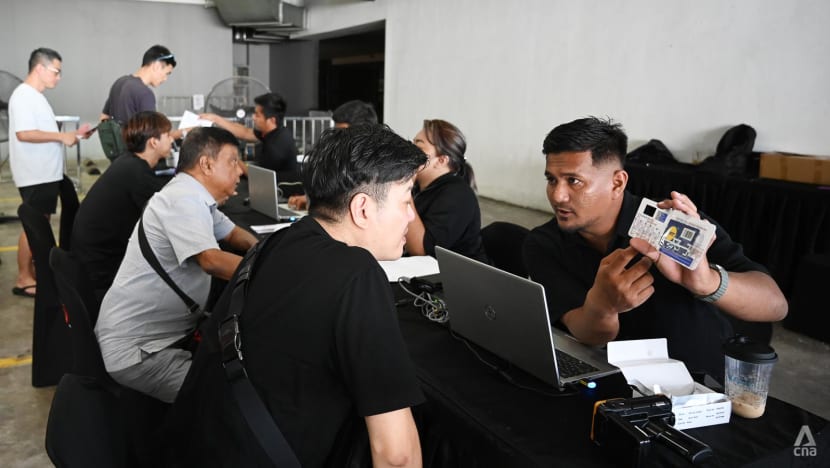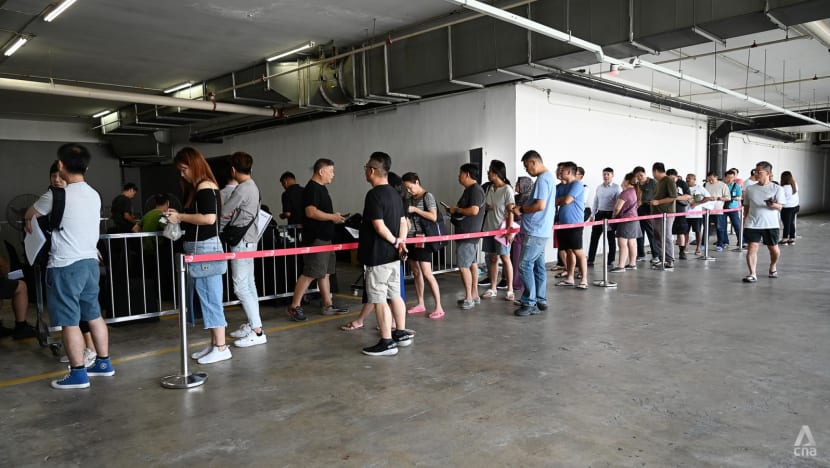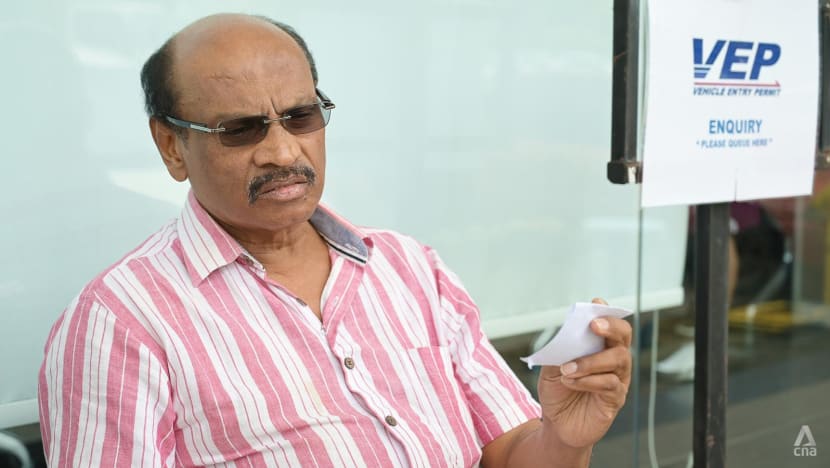VEP still not fully enforced, Singapore drivers have ‘nothing to worry’ about for now: Malaysia's transport minister
Singapore drivers who still face issues with their VEP applications told CNA that they are concerned the Malaysian authorities would implement enforcement prematurely.

File photo of the Johor-Singapore Causeway. (Photo: CNA/Zamzahuri Abas)

This audio is generated by an AI tool.
JOHOR BAHRU: Singapore drivers who have not installed Vehicle Entry Permit (VEP) tags onto their vehicles will continue to receive warning notices instead of being fined, Malaysia Transport Minister Anthony Loke said on Wednesday (Dec 18), confirming that the government was still not yet fully enforcing the VEP scheme on foreign motorists.
Loke was responding to a question from CNA on whether action against Singapore motorists with unpaid traffic fines will be taken from Jan 1, 2025, as previously announced by Malaysia’s Road Transport Department (JPJ).
“We have not announced the (full) implementation (of VEP enforcement) yet … Any further enforcement will be communicated and will be announced. So nothing to worry for the drivers,” he said on the sidelines of an event in Kuala Lumpur.
Loke added that at present, drivers who have not applied for the VEP will continue to be issued warning notices, but cautioned that this is a temporary arrangement.
“We are giving notices to drivers who have yet to apply for the VEP, but that is for the time-being. That is still the case right now,” Loke said while urging drivers to complete their registration for the VEP.

The minister did not confirm if Singapore motorists with outstanding fines will face action from Jan 1.
In August, JPJ announced that Singapore motorists with outstanding fines from traffic offences in Malaysia will face enforcement action.
It had warned that foreign drivers with unpaid fines may be denied entry into Malaysia and in extreme cases, their vehicles may be impounded by the authorities there.
This came on the back of Malaysia police outlining that between 1990 and June 2024, Singapore motorists have racked up more than 35,000 unpaid summonses, totalling RM3.5 million (US$783,000).
Malaysia is currently in the first phase of enforcing its VEP system. It announced in May that from Oct 1, all foreign-registered vehicles entering the country by land from Singapore would be required to use VEPs.
The VEP is used by Malaysian authorities to track foreign vehicles and note if the drivers have outstanding fines on traffic offences.
Following the announcement in May, Singapore drivers scrambled to register VEP for their cars, and this resulted in a bottleneck in applications as many expressed frustration over delays in obtaining their radio frequency identification (RFID) tags.
Motorists also faced long queues at the installation centres.

Four days before the start of the VEP enforcement, JPJ announced that it would be "executed in phases" and Singapore cars yet to install VEP tags by the Oct 1 deadline will still be allowed to enter Malaysia.
The Malaysia government had previously said that motorists who fail to install a VEP may be fined up to RM2,000 (US$484) or jailed for up to six months.
Loke had previously said that his government was taking a “very gradual approach” in enforcing VEP and that those drivers who enter Malaysia without a VEP RFID tag installed would receive a warning notice.
He added then that when the government would comment on the second phase of enforcement, drivers will be given sufficient notice.

Automotive expert Muhd Raden Anwar - who is also chief executive officer for one of Malaysia's biggest car rental players Wahdah - told CNA that it would be “logical” for the government to enforce fines against Singapore motorists “only when” almost all the VEP applications have been completed and their tags activated.
“It would not be fair if the government enforces the payment of fines when many Singapore drivers are still facing issues getting their (RFID) tags and installing them,” he added.
However, Muhd Raden acknowledged that the VEP was a tool to ensure the government could track foreign drivers who have outstanding fines, and that implementing the system was a positive move.
“It's a way to also track data of foreign vehicles that enter the country and this can help (with) urban planning,” he added.
Loke had previously said that as of Sep 30, Malaysia has issued 112,658 RFID tags to drivers, of which 75,412 have been activated.
DRIVERS' CONCERN ABOUT PREMATURE ENFORCEMENT
When CNA did checks at the four VEP centres in Johor Bahru recently, there were generally no long queues and most drivers could complete the process in less than an hour.
However, some drivers continued to face issues in the application process, and expressed concern that potential enforcement could be implemented prematurely.
Singaporean driver Setiamorti Suppiah told CNA last week that he was having issues completing his VEP application despite coming down to the TCSens Danga Bay office seven times over the past five months to make enquiries with officials.
“It’s been utterly frustrating, I applied when they first announced it (in May) but it's still not done,” added the retiree, who said that although his RFID tag had already been installed on his car, the RFID sensors at the toll booths could not detect the mechanism.

Suppiah added that he understood that the VEP system was an important requirement but that he has been left disappointed by how the process was “not intuitive to users”.
“I don’t think they can enforce the VEP or even those with outstanding fines if they have not finished processing all the VEP applications,” he said.
Meanwhile, another Singaporean - a 35-year-old who wanted to be known only as Asyraf - told CNA that he had an outstanding traffic fine with Malaysia police for speeding.
Asyraf also has technical issues completing his VEP installation process as his RFID tag cannot be paired with his Touch N' Go mobile wallet account.
He said that he is keen to pay his fine but that when he recently visited the traffic police machine kiosk at the Johor Bahru municipal building, there was an "out of order" sign.
"I hope all these issues get ironed out before the enforcement is (implemented on Singapore motorists)," he added.
According to an official from TCSens - the vendor company appointed by Malaysia’s JPJ to handle queries from Singapore drivers - there has been no word on when the department or the transport ministry plan to implement the next phase of VEP enforcement.
TCSens currently manages 5 VEP centres - four in Johor Bahru and one in Woodlands.
The official told CNA: "We are focused on clearing the remaining applications as quickly as possible ... based on feedback we have gotten the waiting times are shorter now and the experience more pleasant for drivers.
"It's possible that the enforcement will be done some time in 2025 but the announcement has to be made by the authorities," the official added.
The VEP was first announced in 2017 with the aim of tackling car theft and cloning syndicates, and to prevent vehicles from leaving the country without paying fines for traffic offences.
Full enforcement was initially set for 2019 but it was delayed multiple times.




















